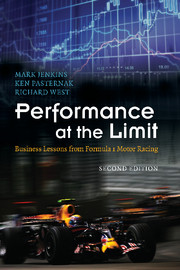Book contents
- Frontmatter
- Contents
- List of figures
- List of tables
- List of plates
- Acknowledgements
- Note on the reference system
- The Grand Prix experience
- 1 Introduction
- 2 Why Formula 1 motor racing?
- 3 The performance framework
- 4 The war for talent
- 5 Winning through teamwork
- 6 Capability through partnerships
- 7 The high-performance organisation
- 8 Integrating
- 9 Innovating
- 10 Transforming
- 11 Achieving and sustaining performance
- 12 Twelve business lessons from Formula 1 motor racing
- Appendix A Grand Prix Champions 1950–2008
- Appendix B Grand Prix Graveyard 1950–2008
- Appendix C Interview respondents
- References
- Index
- Plate section 1
- Plate section 2
2 - Why Formula 1 motor racing?
Published online by Cambridge University Press: 05 August 2013
- Frontmatter
- Contents
- List of figures
- List of tables
- List of plates
- Acknowledgements
- Note on the reference system
- The Grand Prix experience
- 1 Introduction
- 2 Why Formula 1 motor racing?
- 3 The performance framework
- 4 The war for talent
- 5 Winning through teamwork
- 6 Capability through partnerships
- 7 The high-performance organisation
- 8 Integrating
- 9 Innovating
- 10 Transforming
- 11 Achieving and sustaining performance
- 12 Twelve business lessons from Formula 1 motor racing
- Appendix A Grand Prix Champions 1950–2008
- Appendix B Grand Prix Graveyard 1950–2008
- Appendix C Interview respondents
- References
- Index
- Plate section 1
- Plate section 2
Summary
We have some iconic figures, probably starting with Senna, then Schumacher and now Lewis Hamilton; individuals that transcend Formula 1 and become global stars with the help of the media platform. It has just mushroomed in such a dynamic way. It’s because it’s got some glitz and glamour, a bit of skulduggery, a bit of everything really.
Martin Brundle, former Formula 1 driver and now driver manager and commentatorFormula 1 motor racing provides many important ingredients to help us explore the nature of organisational performance. The first is a clear, unambiguous performance outcome – consistently winning races and thereby consistently outperforming the competition. The fundamental importance of this measure of performance, and one which is often overlooked by managers striving to improve their organisations, is that it is concerned with relative advantage. The notion of competitive advantage is based on the premise that an organisation’s performance is superior relative to all available competition. Formula 1 clearly exhibits this criterion, as a team may make significant performance enhancements to its own car, only to find that it has become inferior to the competition that has made greater advances, and therefore it is the relative rather than absolute pace of improvement that is needed to improve and sustain a competitive position.
- Type
- Chapter
- Information
- Performance at the LimitBusiness Lessons from Formula 1 Motor Racing, pp. 10 - 28Publisher: Cambridge University PressPrint publication year: 2009



